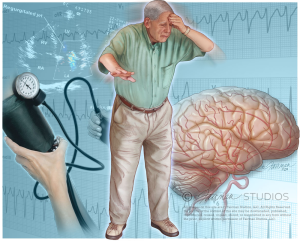Syncope, also known as fainting, is a sudden, temporary loss of consciousness.
THE CAUSES:
Syncope is caused by a temporary decrease in the flow of blood to the brain. A large number of situations or conditions can cause this decrease in blood flow. They can include straining for a prolonged period of time, common mild illnesses like as simple as the cold or flu or sinusitis, standing up too quickly allowing the blood to drop from the brain in decreasing blood supply to that area, emotionally stressed, heart disease, standing rigidly for a long time, arrhythmias (abnormal heart beats = irregular heartbeats), pain, fright, drugs and alcohol.
Certain heart conditions can cause syncope. They include heart attacks, certain arrhythmia (like atrial fibrillation), hypertropic cardiomyopathy (A disease that involves thickening of the heart muscle which is greatest in size on the L side of the heart since that side of the heart has to pump blood to the feet up to the head and back to the right side of the heart; the Rt. side of the heart only pumps blood from the Rt side of the heart to lungs and back to the L side of the heart with oxygenated blood.) Other conditions causing syncope can be disorders of the heart valves, or heart blocks (a problem with the heart’s electrical system blocked due to the conduction system not going completely from the top to the bottom of the heart which can be slight (1st degree heart block to moderate=2 types of 2nd degree heart block to completely being 3rd degree heart block).
DIAGNOSIS:
Like any other condition in determining the cause we have to use diagnostic tools through certain tests to figure out the actual etiology of the syncope or any symptoms you’re experiencing.
The doctor will start with a thorough physical exam and review of your medical history with significant changes from your last physical or visit with the doctor. The doctor may recommend certain diagnostic tests to determine the cause of your fainting episodes. These tests could include: X-rays, use of a Holter monitor (a device that you wear during the day that records the electrical activity over a period of time), or other diagnostic or imaging testing procedures.
Our doctor might recommend a “tilt-table test”. This test involves a special table that tilts upright. Sometimes, medications are given during the test to help with the diagnosis. Your doctor may order a Stress Test where you walk to run on a treadmill with or without IV contrast to determine if this is possible cardiac situation and if it is than the doctor would further order other cardiac testing from Echocardiogram (soundwaves checking the heart) to microsurgery possibly like an angiogram (cardiac cath)=microsurgery if the situation was a blockage in an artery that needed to be declogged than a angioplasty would be performed if you were a candidate for this procedure, which a cardiologist would decide.
PREVENTION OF THIS PROBLEM:
If this was to prevent cardiac conditions from occurring to stop the syncope from occurring live a life with a healthy diet, balancing exercise and rest and if overweight start a program with both diet and exercise involved. To do it right first go to a cardiologist, if obese or overweight, to do it safe and correctly.
Already with some type of cardiac problem than be compliant in what your cardiologist provides you in your individual plan of care in treating this condition to prevent it worsening or causing other problems as well.
TREATMENT:
Treatment depends on the cause of the fainting spells. If the problems are related to medications the doctor may have to change the dosage or the type of medication. Medications are generally not required to treat syncope, but they might be required to treat the cause of syncope.
Most fainting spells are not dangerous. Individuals usually regain consciousness on their own in a few minutes.

